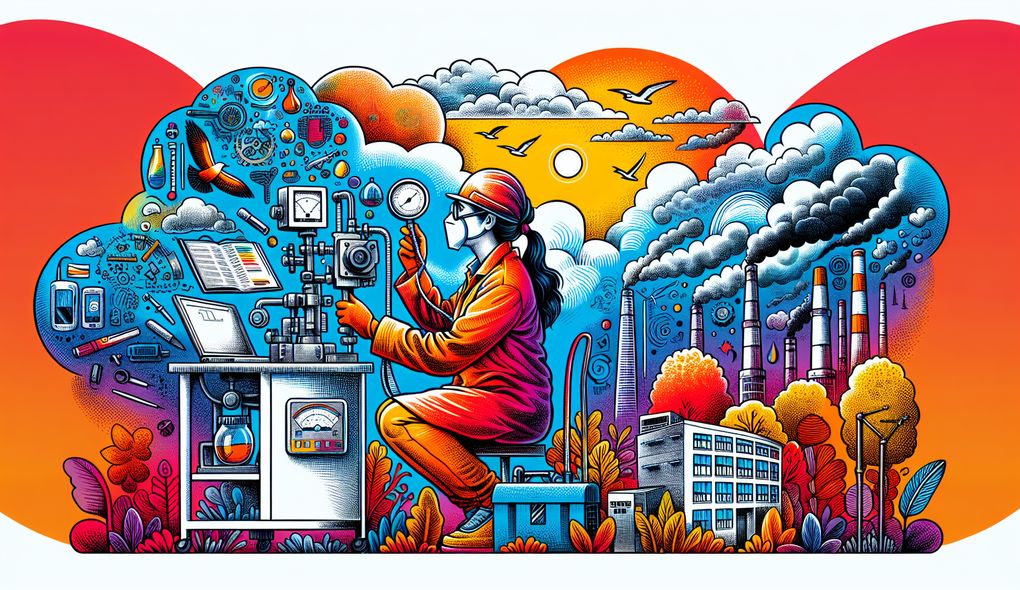How do you ensure ethical and responsible data collection and analysis practices?
SENIOR LEVEL

Sample answer to the question:
When it comes to ethical and responsible data collection and analysis practices, I always begin by familiarizing myself with the relevant regulations and guidelines. This ensures that I am aware of the legal requirements and standards that need to be met. In addition, I prioritize accuracy and thoroughness in data collection by following standardized protocols and using reliable equipment. I also take steps to protect the privacy and confidentiality of individuals or organizations involved in the data collection process. For analysis, I employ rigorous analytical methods and software tools to ensure the accuracy and reliability of the results. Finally, I believe in the importance of transparent reporting, providing clear and comprehensive documentation of the data collection and analysis processes.
Here is a more solid answer:
Ensuring ethical and responsible data collection and analysis practices is paramount in my work as an Air Quality Technician. Firstly, I thoroughly familiarize myself with the relevant regulations and guidelines, such as those set by environmental agencies and government bodies. This ensures that I am well-informed about the legal requirements and standards that must be adhered to. In terms of data collection, I prioritize accuracy and thoroughness by strictly following standardized protocols and using reliable equipment. I document each step of the collection process meticulously, including information about the location, date, time, and any other relevant details. This allows for easy verification and replication of the data if needed. To safeguard privacy and confidentiality, I ensure that all collected data is anonymized and properly secured. I am also well-versed in handling sensitive information and have a strict adherence to confidentiality agreements. For data analysis, I employ rigorous analytical methods and rely on reputable software tools to ensure the accuracy and reliability of the results. I perform detailed quality checks and validations to verify the data integrity before proceeding with analysis. Lastly, I believe in the importance of transparent reporting. I provide clear and comprehensive documentation of the data collection and analysis processes, including any limitations or uncertainties involved. This transparency helps stakeholders understand the reliability and validity of the findings.
Why is this a more solid answer?
The solid answer expands upon the basic answer by providing specific details and examples of how the candidate ensures ethical and responsible data collection and analysis practices. The candidate discusses their familiarity with regulations and guidelines, their commitment to accuracy and thoroughness in data collection, their methods for protecting privacy and confidentiality, their use of rigorous analytical methods and software tools, and their dedication to transparent reporting. The answer could be improved with more specific examples of the candidate's past experiences with these practices.
An example of a exceptional answer:
Ethical and responsible data collection and analysis practices are of utmost importance to me as an Air Quality Technician. To ensure adherence to regulations and guidelines, I actively engage in continuous learning and professional development to stay updated about the latest industry standards and best practices. Whenever I embark on a data collection project, I meticulously plan and design the process, including selecting appropriate sampling techniques, establishing quality control measures, and developing standardized protocols. By conducting detailed risk assessments, I identify potential ethical concerns and implement mitigation strategies accordingly. Upholding privacy and confidentiality, I strictly adhere to data protection regulations and maintain a secure data management system. To enhance data accuracy and reliability, I leverage advanced statistical methods and innovative software tools to analyze the collected data. Additionally, I actively involve stakeholders in the analysis process to ensure transparency and collaborative decision-making. In terms of reporting, I go beyond standard requirements by providing comprehensive and user-friendly reports that include not only the analysis results but also actionable recommendations for improving air quality. I also collaborate with relevant organizations to advocate for responsible data collection practices and contribute to the development of industry standards.
Why is this an exceptional answer?
The exceptional answer demonstrates the candidate's extensive knowledge and commitment to ethical and responsible data collection and analysis practices. The candidate highlights their continuous learning and professional development efforts to stay updated with industry standards and best practices. They also emphasize their meticulous planning, risk assessment, and mitigation strategies to address ethical concerns during data collection. The candidate's use of advanced statistical methods and innovative software tools showcases their dedication to data accuracy and reliability. Their collaboration with stakeholders and provision of comprehensive reports with actionable recommendations further demonstrates their commitment to transparency and the improvement of air quality. The candidate's advocacy for responsible data collection practices and their involvement in industry standards development showcase their dedication to advancing ethical practices in the field.
How to prepare for this question:
- Familiarize yourself with relevant regulations and guidelines related to data collection and analysis in the field of air quality monitoring.
- Stay updated with the latest industry standards and best practices through continuous learning and professional development.
- Develop a strong understanding of risk assessment and mitigation strategies to ensure ethical data collection practices.
- Gain proficiency in advanced statistical methods and software tools used for data analysis in air quality monitoring.
- Practice creating comprehensive reports that not only present analysis results but also provide actionable recommendations for improving air quality.
- Research and familiarize yourself with organizations and initiatives focused on responsible data collection practices in the environmental science field.
What are interviewers evaluating with this question?
- Adherence to regulations and guidelines
- Accuracy and thoroughness in data collection
- Privacy and confidentiality protection
- Rigorous analytical methods
- Transparent reporting

